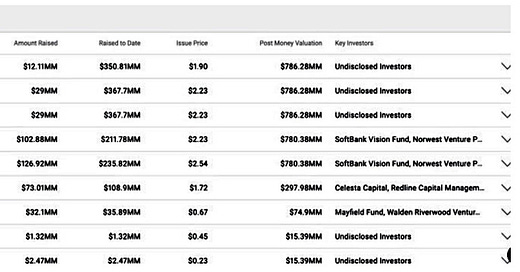Here are fuller details of a Blocks & Files article about a law suit involving Fungible.
The lawsuit alleges that Fungible’s leaders issued convertible promissory notes and made a preferred stock fund raising round to ensure they and other preferred stockholders received most of the proceeds from Microsoft’s $190 million acquisition of Fungible in December 2022.
The lawsuit, case number 2023-0007-JTL in the Delaware Chancery Court, demands that the complainant (plaintiff) Naveen Gupta be allowed inspection of Fungible’s books and records in connection with the Microsoft acquisition, including its stockholder list from June 2022 onwards and board level records relating to strategic transactions, promissory notes and Series D financing activities from March 2022 onwards.
It states that “Because it appears that the company provided controlling stock holders, including [redacted] and [redacted] with the Series D Preferred Stock in a self-interested transaction to divert Merger consideration from other Fungible stockholders, Plaintiff has demonstrated a credible basis to suspect wrongdoing.”
Gupta is a Fungible employee of 4 years standing, with stock options through which he became a Class A common stockholder.
The main event that led up to the Microsoft acquisition, referred to as a merger in the court document, were that Fungible failed to sell enough of its Data Processing Unit (DPU) and FS1600 network storage file storage system and was in danger of running out of money.
A table from the court document lists Fungible’s funding history;
Caption; This table is confusing as, firstly, the August 2022 $29 million fund raise is listed twice (Series D and Series D-2) with no increase in the amount raised to date from the second mention. Secondly the Series C-2 and Series C round appear to be the wrong way round as the amount raised with the C-2 round is lower than the preceding C-round. Thirdly the amount raised to date from the Series Seed-2 round in November 2015 is lower than the preceding Series Seed-1 round (last 2 lines in the table.)
We have seen a copy of the public filing document for the lawsuit;
Caption. Page 1 of filed court document.
It describes a set of events from which I have tried to carefully construct a timeline;
2022 - Feb - Company employees believe Microsoft acquisition of Fungible was “in the works.”
Mar - Goldman Sachs retained to advise on strategic transactions.
June - Convertible Promissory notes issued to two un-named people which can be converted into preferred stock. We don’t know the amount of debt involved.
Two un-named Fungible people proposed Series D preferred stock financing on “exigent basis” into which the promissory notes would be converted. A proposed independent director was not named in subsequent information statement.The preferred stock was “highly dilutive” and provided holders with a 5x liquidation multiple. This “would essentially entitle its holders to all of the merger proceeds if the company were acquired under the terms being discussed with Microsoft.”
Aug - Company in discussions with Microsoft.
D-2 funding round: $12.1 million.
Aug 25 - First round of Series D preferred stock issued with common stockholders excluded. Included stockholders knew of Microsoft discussions.
Fungible’s board alter the company charter so that the greater of 20 percent or $22 million from the merger (acquisition) would be allocated to other stockholders than the preferred stock holders. (20 percent of $190 million is $38 million.)
Sep - Fungible entered into substantive discussions with Microsoft re acquiring (merging with) Fungible.
Nov 8 - Fungible agreed to merge with a wholly-owned Microsoft subsidiary.
Dec 9 - Fungible sends out confidential information statement to stockholders saying it would merge with the Microsoft subsidiary for $190 million. Plaintiff alleges it misses out much important information.
Plaintiff alleges two un-un-named people received essentially all of the $190 million merger payment.
Dec 27 - Plaintiff Gupta’s demand to inspect books letter sent.
2023 Jan 4 11.59pm - Statutory deadline for Fungible’s response to Plaintiff’s inspection letter not met.
Jan 10 - Law suit filed in Delaware’s Chancery Court.
Eric Hayes was Fungible’s CEO, and co-founder Pradeep Sindhu was executive chairman of the board and Chief Development Officer in the period covered by the timeline from 2022 onwards.
If the court grants Gupta’s plea/request and Gupta and his lawyers find evidence of fiduciary misdeeds then we can expect another law suit to follow this one.
Explanatory notes
Liquidation Preference
This is a clause in a contract that dictates the payout order and how much investors get paid in the case of a corporate liquidation or sale. Typically company investors or preferred stockholders get their money back first, ahead of other kinds of stockholders or debt holders. Liquidation preferences are often used in venture capital contracts and other structured private capital transactions to clarify which investors get paid and in what order during a liquidation or sale of the company.
Liquidation Multiple
Liquidation preferences are expressed as a multiple of the initial investment, and commonly set at 1X, meaning that investors would need to be paid back the full amount of their investment before any other equity holders. Only holders of preferred stock receive liquidation preferences and the liquidation multiple can be set at more than 1X, meaning they get out more than they paid in.
Convertible Promissory Notes
Convertible notes are promissory notes that represent debt, such as an interest rate and the pledge of underlying security (if applicable). The lender under a convertible note (called the creditor or the holder) has a right, under certain circumstances, to convert all or a portion of the outstanding debt in the note into stock of the corporation.
Exigent Basis - requires immediate action.





